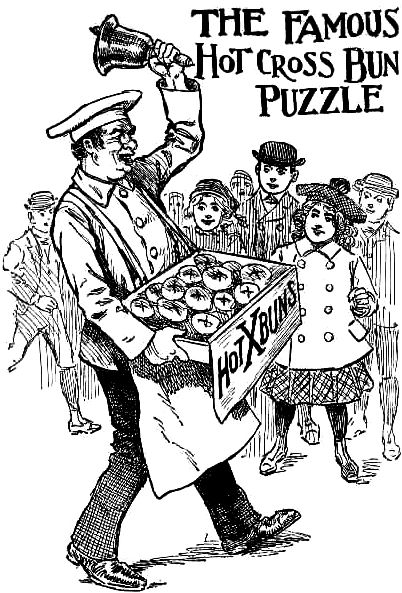



HERE IS A TIMELY souvenir calculated to interest such philosophers as have been delving into the hidden meanings of Mother Goose's quaint rhymes, for as a matter of fact most of those jingling old melodies conceal riddles or puzzles which are really worthy the investigation of us children of a larger growth. Now, just listen to the cry of the Hot Cross-Bun man:
“Hot-cross buns, hot-cross buns,
One a penny, two a penny,
Hot-cross buns.
If your daughters don't like them
Give them to your sons!
Two a penny, three a penny,
Hot-cross buns.
I had as many daughters
As I had sons.
So I gave them seven pennies
To buy their hot-cross buns.”
The inference is clear that there are three sizes of buns—one for a penny, two for a penny and three for a penny. There were just as many boys as girls, and they were given seven pennies so as to treat each one alike. How many buns did each receive?
The wording of the song of the hot-cross-bun man show's that there must be an even number of children, as there were just as many daughters as there were sons. Seven pennies were to be invested in buns at the rate of a penny, two for a penny or three for a penny. The supposition is that there were three boys and three girls, so by purchasing six buns two for a penny and twelve three for a penny each child could then receive buns according to programme, one half-penny and two three-for-a-penny buns to each. Despite the various attempts to solve the puzzle in other ways, this will be found to be the only answer.
2. Put Eleven Men in Ten Beds.
Every now and then some correspondent, probably a hotel keeper in search of practical information asks tor an explanation of the following perplexing proposition:
An innkeeper had a sudden influx of guests, eleven arriving in one party and demanding separate beds. The host had only ten beds at his disposal, but he notwithstanding managed to accommodate them as follows: He put two in the first bed, with the understanding that the second should have a bed to himself in a few minutes as soon as the others were settled. He then put the third in the second bed, the fourth in the third bed, and so on the tenth being accommodated in the ninth bed. He had thus one bed still left, which the eleventh man, who was temporarily placed in the first bed, was now invited to occupy.
As a matter of course this problem is not supposed to be susceptible of a rigid mathematical demonstration. It is based on a paradoxical proposition, but the error is so cleverly concealed that it is liable to avoid detection. That is all there is to it.
3.
Why is a room full of married folks like a room empty? Because there is not a single person in it.
How many wives are you allowed by the Prayer-book? Sixteen: viz. fo(u)r better, 4 worse, 4 richer, 4 poorer; total sixteen.
Why are good intentions like fainting ladies? Because all they want is carrying out.
What is the difference between a carriage-wheel and a carriage-horse? One goes better when it is tired; the other don’t.
Formed long ago, yet made to-day,
I'm most employed while others sleep;
What none would like to give away,
Yet no one likes to keep?
Bed.
I came to a field and couldn’t get through it,
So I went to a school and learned how to do it?
Fence.
What is that which, supposing its greatest breadth to be four inches, length nine inches, and depth three inches, contains a solid foot? A shoe.
What was the difference between Noah’s ark and Joan of Arc? One was made of wood, the other was Maid of Orleans.
There is a word of three syllables, from which if you take away five letters a male will remain; if you take away four, a female will be conspicuous; if you take away three, a great man will appear; and the whole word shows you what Joan of Arc was? He, her, hero, heroine.
What is that which a young girl looks for, but does not wish to find? A hole in her stocking.
[Page 95]